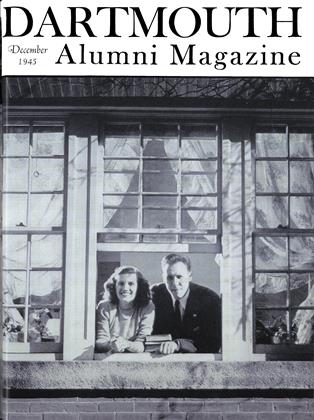CAPTAIN CUMMINGS HAILS COLLEGE ON ROLE IN U. S. NAVY PROGRAM
In his address at the brief ceremony marking the commissioning of Dartmouth's new NROTC and V-12 Unit on November 1, Captain Damon E. Cummings, USN, commanding officer, paid to the College a sincere tribute which the MAGAZINE is pleased to present here in full:
DARTMOUTH COLLEGE has reached out to contribute to the Navy during and preceding the emergency now happily ended. The Navy's needs called first for mature college men to be hurriedly prepared to supplement the officer personnel of the Navy. Dartmouth College provided an indoctrination school for that purpose.
The next need was for young men of college age to be quickly given a minimum accelerated preparation including college work to fill the gaps that could wait a little longer. Dartmouth College trained many men in the V-12 program for this purpose. These were but stopgaps to meet in time urgent needs, and those whom Dartmouth College trained, wherever they went to more advanced schools averaged better than those among whom they found them- selves. Dartmouth College can, therefore, take pride in the quality of the training which it gave these men. It has stood the test of competition and of successful performance in the Navy.
The long-time need of the Navy called for a permanent officer training program with a full length basis of college work, including NS courses. For this, Dartmouth College applied, well in advance of the expressed need, for an NROTC Unit so that the commissioning of that Unit today is the result of Dartmouth's early solicitude to be of service to the Navy, rather than of the Navy's recruitment of Dartmouth to render that assistance. However, the Navy has frequently recognized the excellent performance which Dartmouth has rendered, and has been very happy that Dartmouth could be counted among those who would contribute to the solution of long- time officer training.
The V-12 program was a temporary one, fully prescribed, and instruction was entirely by Dartmouth College. The ROTC program differs in a number of respects from this. It contemplates an undergraduate professional course coupled with a liberal education. Instruction is partly by naval officers, who during their relatively short tours of duty as instructors are given academic rank by Dartmouth College. But Dartmouth College also contributes very largely with its regular staff to the education of the prospective officers, and I feel confident that they will emerge from training at this Unit with the necessary basic professional knowledge and training essential to their future careers, and also with the liberal education which Dartmouth consistently aims to afford those who are capable of achieving it.
The mixing of these two dissimilar elements offers a challenge both to the Navy and to the College to work out a solution which will at the same time produce naval officers with an equal chance for a successful naval career and college graduates comparable to those in other fields. So far as Dartmouth College is concerned, I have not the slightest doubt that the problems involved will be successfully solved, and I say that in light of two years of very gratifying experience in which Dartmouth College has shown its earnest desire and' its resourceful ability to offer full cooperation with naval needs without compromising its own essential standards.
THE DARTMOUTH NROTC UNIT IS FORMALLY COMMISSIONED. President Dickey is shown signing the orders of Captain Damon E. Cummings, USN, who continues as commanding officer of all naval forces stationed at the College.
 View Full Issue
View Full Issue
More From This Issue
-
 Article
ArticleTHE DEAN UNMASKED
December 1945 By HERBERT F. WEST '22, -
 Article
ArticleTHE VETERAN RETURNS
December 1945 By PROF. Wm. STUART MESSER, -
 Class Notes
Class Notes1945
December 1945 By ARTHUR NICHOLS, JOHN W. CALLAGHAN -
 Class Notes
Class Notes1917
December 1945 By MOTT D. BROWN, DONALD BROOKS -
 Article
ArticlePRESIDENT DICKEY INDUCTED
December 1945 -
 Class Notes
Class Notes1918
December 1945 By ERNEST H. EARLEY, DONALD L. BARR
Article
-
 Article
ArticleLACROSSE IS INSTITUTED AS RECREATIONAL ACTIVITY
April, 1925 -
 Article
ArticleDiamonds into Pearls
April 1976 -
 Article
ArticleHeaded to Washington
Nov/Dec 2005 -
 Article
ArticleEnrollment
November 1953 By C. E. W. -
 Article
ArticleGANGSTER INVADES HANOVER
DECEMBER 1930 By Craig Thorn, Jr. -
 Article
ArticleThe Undergraduate Chair
March 1954 By DICK MAY '54

